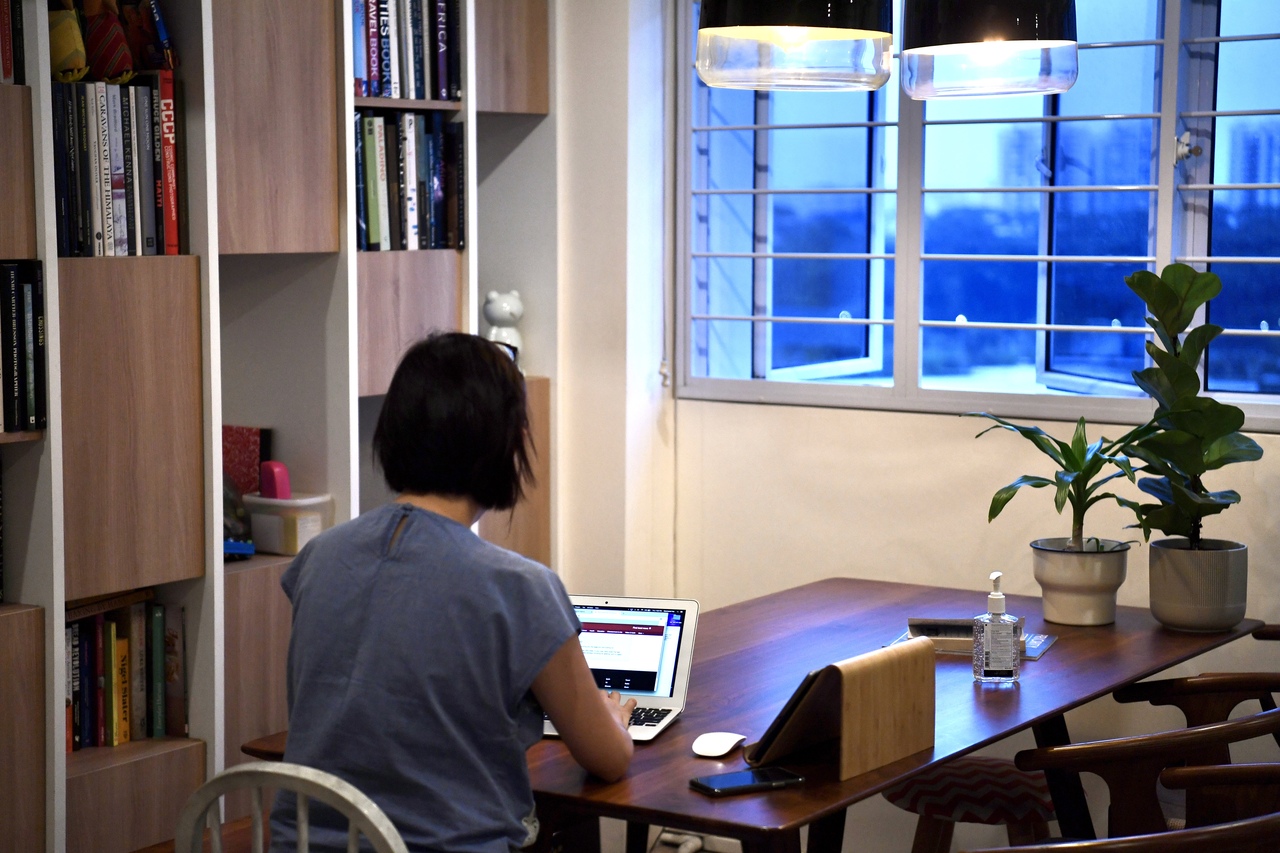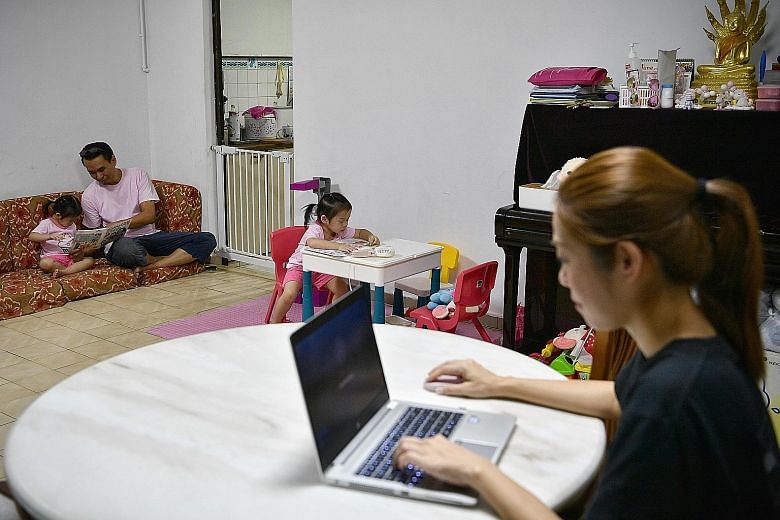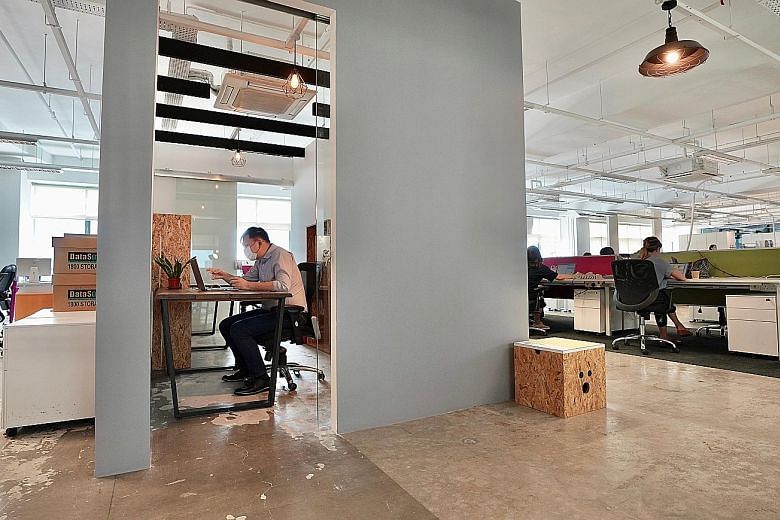Singaporeans are adjusting to working from home, new poll shows
Overall productivity of employees rose from April to June; not all sectors adapting well
Sign up now: Get ST's newsletters delivered to your inbox

The survey found that 40 per cent of employees who are parents said they felt stressed while working from home.
PHOTO: ST FILE
Singaporeans have learnt over time to better adjust to working from home, as new survey data shows that overall productivity among employees gradually increased from April to June.
According to a survey by employee engagement platform EngageRocket that had 20,000 respondents from 127 companies across various sectors, about 23 per cent said in June that they were more productive working from home than when they worked in the office before the coronavirus outbreak.
This number was up from the 15 per cent in April, when the circuit breaker period had just begun and employees were starting to work from home.
Mr Leong Chee Tung, co-founder and chief executive of EngageRocket, said: "Productivity levels increased between the start of the circuit breaker and phase two, reflecting the way leaders (of companies) are successfully responding to this crisis."
He added: "Our study paints a remarkable picture of the resilience and adaptability of Singapore's workers."
The report, released last week, was conducted in partnership with the Singapore Human Resources Institute and the Institute for Human Resource Professionals.
Despite the gradual improvement in productivity, challenges in remote work persist for some employees. These include space constraints at home or distractions from family members, and they can cause high levels of stress for workers.
"Even in the best of times, prolonged working from home is linked to harmful impacts on mental well-being," said the report.
The mental-health impact is not the same across all sectors, however.
For example, the finance and technology sectors, which rely largely on a desked workforce who can more easily work remotely, had employees who were less likely to be stressed. Eleven per cent of workers in finance said that their stress levels were unacceptable, while 17 per cent of workers at technology companies said the same.
Meanwhile, the education sector had the biggest proportion of workers - 30 per cent - who said their stress levels while working remotely were unacceptable. This was most likely linked to uncertainties during the circuit breaker when schools were shut and had to move to full home-based learning.

Even after restrictions were lifted and schools started opening in phases, 23 per cent of those working in education said they had unacceptable levels of stress, still the highest across all sectors surveyed.
The survey also found that 40 per cent of employees who are parents said they felt stressed while working from home - double the overall average.
Among the reasons for parents' stress levels are the need to work longer hours than usual, family presence and space constraints, and having to attend to their children's home-based learning assignments.
Telecommuting remains the default mode of work for all companies, according to Ministry of Manpower guidelines. Employees should go to the office only when necessary, or to fulfil legal requirements.
However, at some companies, employees have asked if they could return to the workplace.
At cloud-based software company Deskera, some workers "can't wait" for the virus situation to get better so that they can go back to the office, said chief executive Shashank Dixit.
Noting that there is no adequate virtual replacement for physical office interactions, he said: "For some people, it's also a social need, because people who are used to working in teams can sometimes feel like they are working in silos when at home, and feel a little lost."
Employees at public relations agency PRecious Communications have also requested that they be allowed to return to the workplace, citing reasons such as the number of household members at home and poor Internet connections.
Managing director Lars Voedisch said that the company gave each of its 30 employees a nominal budget of $100 to upgrade their home office set-up, such as by buying a more comfortable chair.
He said: "While we try to be supportive and understanding, we are strictly adhering to the overall guidelines, with work-from-home being the status quo for the time being."
The report added that companies should look into the mental wellness of their workers, because "moving forward, employees' priorities are sure to shift" amid the pandemic. This is beyond the initial concerns over basic digitalisation of processes just to be able to get work done.
At Software AG, which has about 50 employees here, leaders regularly check in with their staff to chat about things outside of work.
Mindful of the stress that can come from working overly long hours, the company's managers also lead by example by making it a point to go offline at 6pm and avoiding work e-mails after hours.
Ms Anneliese Schulz, Software AG's president for Asia-Pacific and Japan, said: "The transition to working from home has been smooth for us, with no impact to productivity. Our focus has shifted now to ensuring that we encourage people to watch their working times and protect themselves from feeling overwhelmed."
Over at tech giant Google, employees can access a free and confidential service, 24 hours a day, to receive counselling over the phone. The company also has its own mental health awareness group, comprising employee volunteers who provide support for peers should they need it.
Said the EngageRocket report: "In a socially distant world, many managers lack the time and tools they need to effectively identify flight risk, burnout or disengagement. Leaders need to help them understand how their team feels and track progress."
Staying one step ahead of twin toddlers to get work done at home

Office manager Joyce Poh and her computer seemed trapped in an endless game of hopscotch when she was working from home during the circuit breaker.
Ms Poh never left the flat but she and her work station were often on the move, as she juggled the demands of family and job commitments.
The merry-go-round began in the morning when she would start working in the bedroom.
Firms modifying or doing away with office space in new normal

Some companies are modifying their office space in the light of the increasing prevalence of people having to work from home.
Take creative agency DDB Group Singapore, whose office is in the Kallang area.
The firm has removed old cupboards and closed off pantries to create areas for "pods", or mini rooms.


